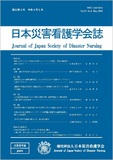Japanese
English
- 有料閲覧
- Abstract 文献概要
- 参考文献 Reference
要約
目的:原発災害により長期避難生活をしている子どもを持つ母親への支援プログラムを実施し、参加した母親のエンパワメントのプロセスを明らかにする。
研究方法:アクションリサーチの手法をとり、参与観察を行った。データ収集期間は2013年11月から17か月であった。支援プログラムは、サロンと称する交流会であり33回実施した。
結果:母親のエンパワメントは4つのフェーズに分けられた。第1フェーズは【ファシリテーターとの関係を作り、避難の体験を打ち明ける】、第2フェーズは【家庭での出来事を共有し、母親同士のつながりが生まれる】、第3フェーズは【仲間意識を持ち、身近な社会に関心を広げる】、第4フェーズは【自然に悩みを話し、サロンの存続を求める】であった。
結論:母親は心に傷を抱えていた。エンパワメントは4つのフェーズを経て発展した。母親の相互作用、支援者の関わりが必要であることが示唆された。
Objective: This study was to implement a support program for mothers with children who had been evacuated for a long time due to the nuclear accident and clarify the empowerment process for participating mothers.
Methods: The action research method was used, and participant observation was conducted. The data collection period was 17 months from November 2013. The support program was implemented in the form of social gatherings that were conducted 33 times.
Results: The empowerment of mothers can be divided into four phases. The first phase was to establish a relationship with the facilitator and reveal the evacuation experience. The second phase was to share what was happening at home and build relationships with each other. The third phase was to establish a sense of fellowship and expand interest in the society around them. And the fourth phase was to talk naturally over their problems and seek the continued existence of the gatherings.
Conclusion: The mothers were emotionally traumatized. Their empowerment developed through four phases. It has been suggested that the interaction of mothers and the involvement of supporters are necessary.
Copyright © 2022, Japan Society of Disaster Nursing All rights reserved.


